From beginning to end
I'll begin a brief report this year where I ended last – thankfulness for the gift of the Cathedral community. A staff well suited to their tasks and a congregation enormously gifted. Both create an environment for ministry rich with possibility.
Welcome and thanks to staff
This past year we welcomed Kurt Schmidt to the half-time position of Director of Christian Formation. You may remember my drawing particular attention to this area of our life together since how we all grow more deeply into our Christian vocation is imperative to the our long term spiritual health. Formation is a clerical responsibility, but not to be enabled primarily by the clergy. The Cathedral is not a normal Anglican parish, but rather to be a model for the church in the Anglican Diocese of Fredericton. That doesn't mean we do everything right, just that we need to attempt to do so. The variety of lay staff in all their special capacities makes for a more than adequate broad foundation on which to build and continue the total ministry of the Cathedral. Each of the lay members of staff create a team for which I am most thankful each day.
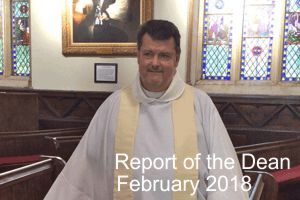 Administrative management progress
Administrative management progress
Our Bishop and Chapter is slowly making progress on several goals to improve the day to day management of our resources and the ministry we share. These inlcude: an improved and intensional records management system; clarified relationships through our committees and the ministries they oversee increases the efficiency and effectiveness of our governance model; reestablishing the practice of an annual financial review according to diocesan standards and; implementing a process of regular staff reviews. These are all important and significant developments and those who have taken initiative to help us along in them are to be commended.
Honorary assistant clergy
I am deeply indebted to the clergy who continue as honourary assistants. Their contributions are a gift to us, the “assistance” they provide, both in the liturgical and the pastoral, is very important to me, not least of all during times when I am absent. Sharing mid-week worship duties, assisting on Sundays and being available for occasional pastoral needs provides me some flexibility. I express my gratitude to them and for their willingness to help.
Day to day
It's the day to day ministry that requires the most effort by staff, many members of the congregation and myself. There are those among us who experience the Cathedral primarily on Sunday, but much needs to happen between weekends. In fact, we all need to be reminded that Jesus enters our life on the ground and his presence informs the ordinariness of that life, works in our relationships and influences what we do and how we do it. While relationships are often messy, they are in fact the most valuable element of the result of our being community together.
Each week at the Cathedral, at least for me, literally flies by. The number of events and efforts of ministry are staggering. That's not meant to be a pat on the back necessarily, but it does point to our identity as members of a body, each of its parts both contributes to and supports the others. It is of significance that we have been able to establish the practice of regular daily prayer at the Cathedral> Such practice is to be customary in all Anglican circles, not least of all in Cathedral churches as we set the example. The daily offices (Morning and Evening Prayer)were said, Monday to Friday, during 2017. For those unable to be present, those who read those offices uphold us all. Others are encouraged to participate anytime and this the official word of encouragement to do so. We need to see our worship and prayer as a natural part of the rest of our lives. You are also invited to consider becoming one of those who lead in this daily prayer. Training and instruction can be made available.
Hellos and goodbyes
Due to changing circumstances, some have left our company. Because of death, we have said some sad goodbyes over the past year. Several with long time faithful affiliations with the Cathedral church family have departed this life. In September it was a privilege to facilitate the visitation, all night prayer vigil and requiem for Archbishop Harold Nutter. We can draw comfort from the promise that we will see them all again.
We have also said hello to others who have chosen to be part of our fellowship, and to them we offer a hearty welcome. The expression of welcome remains somewhat of a challenge for us as it is for any religious community. Those “messy relationships” are often difficult to break into. It is perhaps an unfortunate feature of human nature that we like and love what and who we know best. The face of a church congregation is ever changing and we welcome those who are new with us.
Areas of focus
If I were to identify two areas of focus for us over the next several months, they might be our continuing pursuit of better processes of invitation and welcoming and stewardship.
Invitation and welcoming
This one has been on our radar for a while now. We might find it difficult to recognize, but Anglican churches generally rank too poorly in this regard. It may have something to do with the character of Anglican spirituality as we all see our faith as a deeply personal matter. In worship, we tend to focus downward towards the book or worship resource in our hands, perhaps somehow giving the impression that we are looking for God there. Liturgical worship style is one of our greatest treasurers but we must be constantly reminded that God is for us in the relationships we have with one another. The words of worship only serve to make it possible for us to enter more fully into a corporate experience and expression of the that worship – they are never an end in themselves.

The invitation is the first part, the second is what we do when the invited arrive. In fact, growing churches (and reports from those who recently joined a church) clearly indicate that it was a particular personal expression of welcome and connection that swayed the decision to come back. Not the sermon, not the music, not the beauty of the church building. And while we are quick to identify ourselves as a “friendly bunch,” that assessment is far from valid when made by any of "us."
That's not to suggest that we are never successful in both invitation and welcoming, only that we need to assure these are not randomly executed. We all need to continuously be encouraged to actively invite. We need clear and well known processes for what happens when someone new is in our midst.
Stewardship
We're making significant progress in the improvement of corporate stewardship. Here a needed reminder is that “stewardship” is not just about money. Stewardship practices involve the management of everything God has given: skills and talents, prayer, schedules, leadership and perhaps last of all, finances. How we manage our resources corporately is the important first step in our own individual stewardship. Who would endeavour to support an organization that doesn't visibly manage its resources well?
By far not the only management responsibility, careful attention to money is part of the package. Our Treasurer has reported that in 2017 our income offset our expenses. That's always good news. I was once asked the question: "If our church has more than enough, why are we (the congregation) being asked to give more?" There may be two good answers to that question:
1) With resources available in excess of the day to day expenses, new dreams, new visions, new ministry is possible. Churches enslaved to their budgets simply do not have the ability to listen and answer the call to do what God would have them do. Financial resources in excess of regular expenses should not, in our minds, represent the church being in a situation of extravagance. Why would we not rather believe that God has something important for us to do in the future and also making it possible? The human spirit finds it so much easier to look backward than forward.
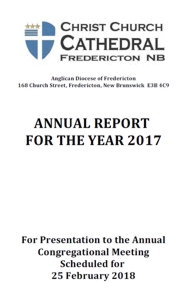
Bishop and Chapter
Finally a thanks to those who form the corporate presence of the Cathedral. Especially to departing members of the Chapter, members remaining, officers, delegates to Synod, sincere thanks for your service. Let us pray that 2018 will bring with it continuing opportunities for progress on many fronts, that we will have the resources to successfully meet them in a way that we can make a difference, and that God will bless our efforts to proclaim the Gospel of Jesus Christ and make disciples in his name.
Respectfully submitted,
Geoffrey Hall (The Very Rev'd), Dean of Fredericton








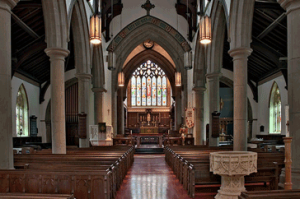
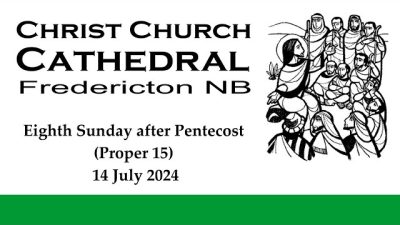

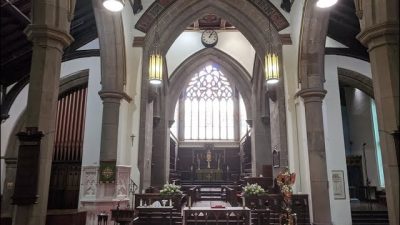

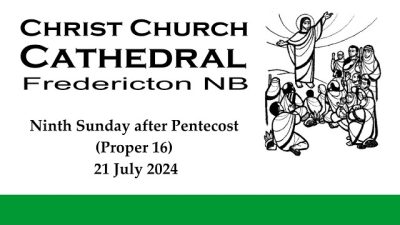




Recent Comments